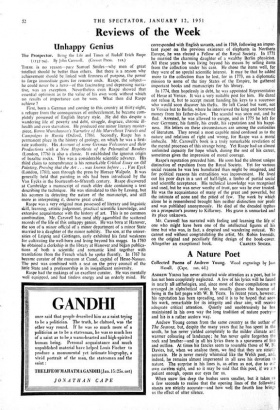Reviews of the Week
Unhappy Genius
THERE is no reason—pace Samuel Smiles—why men of great -intellect should be better than others. But there is a reason why achievement should be linked with firmness of purpose, the power to forgo inunediate gains for remoter ends. Raspe, the subject— he could never be a hero—of this fascinating and depressing narra- tive, was an exception. Nevertheless even Raspe showed that essential optimism as to the value of his own work without which no results of importance can be won. What then did Raspe achieve ?
First, born a German and coming to this country at thirty-eight, a refugee from the consequences of embezzlement, he became com- pletely possessed of English literary style. He did this despite a wandering life of poverty and debt, struggle, disgrace, chronic ill- health and even starvation. He produced one minor literary master- piece, Baron Mutzchausen's Narrative of his Marvellous Travels and Campaigns in Russia (Oxford, 1786). Secondly, Raspe has a permanent place in the history of geology, on which he was a first- rate authority. His Account of some German Volcanoes and their Productions with a New Hypothesis of the Pristnatical Basaltes (London, 1776) is also a classic. It established the igneous origin of basaltic rocks. This was a considerable scientific advance. His third claim to remembrance is his remarkable Critical Essay on Oil Painting, Proving that the Art... was known before. . . Van Eyck (London, 1781), seen through the press by Horace Walpole. It was generally held that painting in oils had been introduced by the Van Eycks in the fourteenth-to-fifteenth century. Raspe discovered at Cambridge a manuscript of much older date containing a text describing the technique. He was stimulated to this by Lessing, but his acumen in detecting the nature of the manuscript, and still more in interpreting it, deserve great credit.
Raspe was a very original man possessed of literary and linguistic skill, learning, artistic judgement, practical scientific knowledge, and extensive acquaintance with the history of art. This is no common combination. Mr. Carswell has most ably assembled the scattered records of the life of this unhappy genius. He was born at Hanover, the son of* minor official of a minor department of a minor State married to a daughter of the minor nobility. The son, at the univer- sities of Leipzig and Gottingen, early exhibited his fatal weakness for cultivating the well-born and living beyond his metgs. In 1760 he obtained a clerkship in the library at Hanover and began publica- tions of both a scientific and romantic kind together with translations Rom the French which he spoke fluently. In 1767 he became curator of the museum at Cassel, capital of Hesse-Nassau. The post was combined with a seat on the privy council of the httle State and a professorship in its insignificant university.
Raspe had the makings of an excellent curator. He was mentally well equipped, and had tireless energy and an orderly mind. He
corresponded with English savants, and in 1769, following an impor- tant paper on the previous existence of elephants in Northern Europe, he was elected a Fellow of the Royal Society. In 1771 he married the charming daughter of a wealthy Berlin physician. All these years he was living beyond his means by selling items from the collection under his care. He chose the items well, for they were of no special scientific interest. It may be that he added more to the collection than he lost, for in 1773, on a diplomatic mission to some of the tiny States of the Empire, he gathered important books and manuscripts for his library.
In 1774, then hopelessly in debt, he was appointed Representative of Hesse at Venice. It was a very suitable post for him. He dared not refuse it, but to accept meant handing his keys to a successor who would soon discover his thefts. He left Cassel but went, not to Venice but to Berlin, where he interviewed the king and borrowed money from his father-in-law. The scandal was soon out, and he fled. Arrested, he was allowed to escape, and in 1775 he left for ever Germany, his family, his credit, his ieputation and his happi- ness. His letters on these circumstances are among the curiosities of literature. They reveal a most capable mind confused as to the nature and relations of right and wrong, for Raspe was a moral imbecile. Mr. Carswell's book is a truly remarkable revelation of the mental processes of this strange being. Yet Raspe had an almost unlimited capacity for hope which, during the rest of his career, sometimes gives the impression of moral courage.
Raspe's reputation preceded him. He soon had the almost unique distinction of expulsion from the Royal Society. Yet for various social reasons he was less humiliated than might be imagined, and for political reasons his extradition was inconvenient. He lived out his poor days in a sort of half-light, a limbo of partial social and scientific acceptance. His technical knowledge was recognised and used, but he was never worthy of trust, nor was he ever trusted. He was the acquaintance of many of the great and powerful, but the intimate of none and the pitied of few. The work by which alone he is remembered brought him neither distinction nor profit and was published anonymously. He died of the dreaded typhus on a prospector's journey to Killarney. His grave is unmarked and its place unknown.
Mr. Carswell has narrated with feeling and learning the life of one who might have been one of the intellectual figures of his time but who was, in fact, a despised and wandering outcast. We cannot end without congratulating the artist, Mr. Robin Ironside, on the original and peculiarly fitting design of the book-cover.
Altogether an exceptional book. CHARLES SINGER.


































 Previous page
Previous page